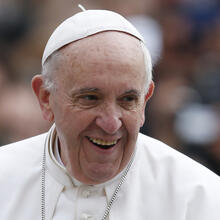Below is the text of Pope Francis’ weekly Wednesday audience, delivered on Dec. 13, 2023.
To receive these remarks and more in your inbox every week, sign up for America’s daily newsletter.
Dear Brothers and Sisters,
Today we will conclude the series dedicated to apostolic zeal, in which we have allowed the Word of God to inspire us, to help nurture a passion for the proclamation of the Gospel. And this involves every Christian. Let us consider the fact that in Baptism, the celebrant, touching the ears and the lips of the baptized, says: “May the Lord Jesus, who made the deaf hear and the mute speak, grant that you may soon receive his word and profess the faith”. (cf. Mk 7:31-35).
And we have heard about the miracle of Jesus. The evangelist Mark goes to great lengths to describe where this took place: toward “the Sea of Galilee” (Mk 7:31). What do these two regions have in common? The fact that they were predominantly inhabited by pagans. They were not areas inhabited by Jews, but mostly by pagans. The disciples went out with Jesus, who can open the ears and the mouth, thus, the phenomenon of mutism, of deafness, which is also metaphorical in the Bible, signifying being closed to God’s calls. There is a physical deafness, but in the Bible, the one who is deaf to the Word of God is mute, and does not communicate the Word of God.
Even at the end of the Gospel, Jesus entrusts us with his missionary desire: go beyond, go and tend, go and preach the Gospel.
There is another indicative sign: the Gospel reports Jesus’ decisive word in Aramaic. Ephphatha which means “be open”, may the ears be open, may the tongue be open. And it is an invitation that is addressed not so much to the deaf man, who could not hear him, but precisely to the disciples of that time and of every age. We too, who have received the ephphatha of the Spirit in Baptism, are called to be open. “Be open”, Jesus says to every believer and to his Church: be open because the Gospel message needs you to witness it and proclaim it! And this also makes us think about the attitude of Christians: Christians should be open to the Word of God and to service to others. Christians who are closed always end up badly because they are not Christians. They are ideologists of closure. A Christian should be open to the proclamation of the Word, and to welcoming brothers and sisters. And this is why ephphatha, this “be open”, is an invitation to us all to open ourselves.
Even at the end of the Gospel, Jesus entrusts us with his missionary desire: go beyond, go and tend, go and preach the Gospel.
Brothers, sisters, let us all feel called, as baptized people, to witness and proclaim Jesus. And let us ask for the grace, as Church, to bring about a pastoral and missionary conversion. On the banks of the Sea of Galilee, the Lord asked Peter if he loved him and then asked him to tend his sheep (cf. vv. 15-17). Let us too ask ourselves. Let each one of us ask ourselves this question, let us ask ourselves: Do I truly love the Lord to the point of wanting to proclaim him? Do I want to become his witness or am I content to be his disciple? Do I take to heart the people I meet, bringing them to Jesus in prayer? Do I want to do something so that the joy of the Gospel, which has transformed my life, may make their lives more beautiful? Let us think about this, let us think about these questions and go forward with our witness.







